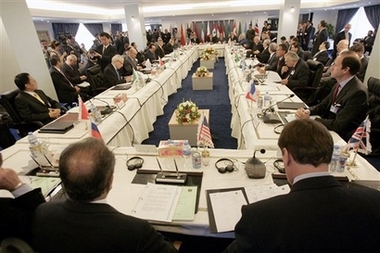US, Iran trade accusations at first talks
(AP)Updated: 2007-03-11 08:52
BAGHDAD - In their first direct talks since the Iraq war began, U.S. and Iranian envoys traded harsh words and blamed each other for the country's crisis Saturday at a one-day international conference that some hoped would help end their 27-year diplomatic freeze.
Iraqi Prime Minister Nouri al-Maliki opened the conference with an appeal for all participants to help ease his country's plight and prevent the violent conflict here from spilling over into the entire Middle East.
 Delegates attend the opening of the groundbreaking peace conference in Baghdad, Iraq, Saturday, March 10, 2007. The Iraqi Prime Minister Nouri al-Maliki appealed Saturday for international help to cut off networks aiding extremists and warned envoys from neighbors and world powers that Iraq's growing sectarian bloodshed could spill across the Middle East. [Reuters] |
But the conference underscored the wide gulf between American and Iranian views over the nature of the crisis and the ways to end it.
During the talks, U.S. envoy David Satterfield pointed to his briefcase which he said contained documents proving Iran was arming Shiite Muslim militias in Iraq.
"Your accusations are merely a cover for your failures in Iraq," Iran's chief envoy Abbas Araghchi shot back, according to an official familiar to the discussions who spoke on condition of anonymity because he was not authorized to release the information.
The U.S. ambassador to Iraq, Zalmay Khalilzad, only said that American delegates exchanged views with the Iranians "directly and in the presence of others" during talks, which he described as "constructive and businesslike."
But Labid Abbawi, a senior Iraqi Foreign Ministry official who attended the meeting, confirmed that an argument broke out between the Iranian and American envoys. He would not elaborate.
Before the talks, U.S. officials said the Baghdad conference would allow all sides to spell out their positions frankly and pave the way for more substantive discussions on resolving the Iraq crisis.
Al-Maliki, a Shiite, appealed for international help to sever networks aiding extremists and warned that Iraq's growing sectarian bloodshed could spill across the Middle East.
Khalilzad also urged nations bordering Iraq ¡ª which include Syria and Iran ¡ª to increase their assistance to al-Maliki's government, saying "the future of Iraq and the Middle East is the defining issue of our time."
"(Iraq) needs support in this battle that not only threatens Iraq but will spill over to all countries in the region," al-Maliki said.
Al-Maliki urged for help in stopping financial support, weapon pipelines and "religious cover" for the relentless attacks of car bombings, killings and other attacks that have pitted Iraq's Sunnis against majority Shiites.
Underscoring the security crisis, at least two mortar shells exploded near the Foreign Ministry where the talks were held but caused no casualties. A suicide car bomber also killed 20 people in the Shiite militia stronghold of Sadr City.
The participants at the talks included all of Iraq's neighbors ¡ª Iran, Syria, Jordan, Saudi Arabia, Turkey and Kuwait ¡ª as well as the U.S., Russia, France, Britain, China, Bahrain, Egypt, the U.N., the Organization of the Islamic Conference and the Arab League.
At a news conference after the meeting, Araghchi restated Tehran's demands for a clear timetable for the withdrawal of U.S.-led forces, which he insisted had made Iraq a magnet for extremists from across the Muslim world.
"For the sake of peace and stability in Iraq ... we need a timetable for the withdrawal of foreign forces," said Araghchi, Iran's deputy foreign minister for legal and international affairs.
"Violence in Iraq is good for no country in the region," he said. "Security of Iraq is our security and stability in Iraq is a necessity for peace and security in the region."
Araghchi said he had no face-to-face, private talks with Khalilzad and that the discussions were "within the framework of the meeting." He spoke of "very good interaction by all the delegations."
Khalilzad, too, called the meeting a "first step."
| 1 | 2 |  |
|
||
|
||
|
|